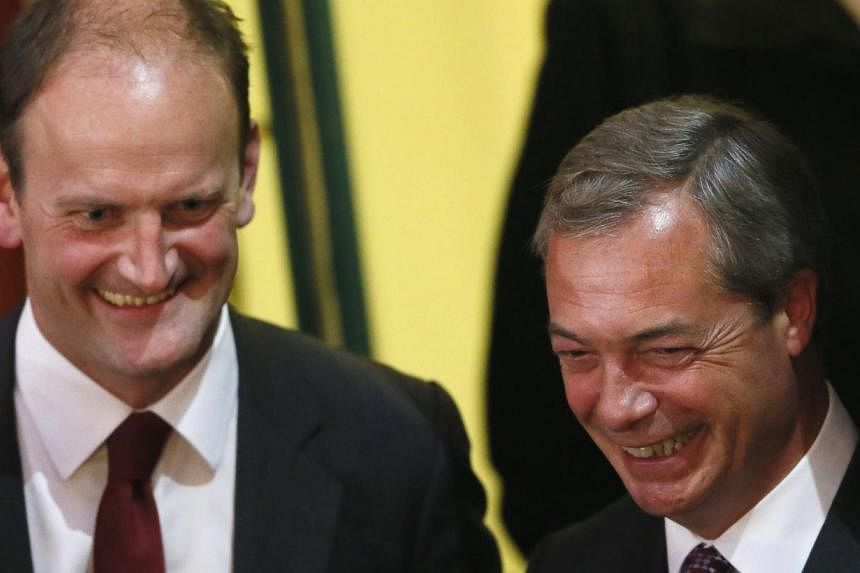CLACTON-ON-SEA, United Kingdom (AFP) - The British anti-EU UK Independence Party won its first elected seat in parliament in a resounding victory on Friday that will rattle the Conservative-led government seven months from a general election.
Douglas Carswell, who defected to UKIP from the Prime Minister David Cameron's party in August, was elected with 60 per cent of the vote in a by-election in the fading coastal town of Clacton-on-Sea that could signal a sea change in British politics.
Under the populist party's banner of cutting immigration and quitting the EU, Carswell was re-appointed to the seat with a larger majority than he won as a Conservative in the 2010 election. "To the electorate of Clacton, my gratitude, thank you for electing me. I resigned from parliament to face this election because I answer first, foremost, and last, to you," Carswell said.
In an allusion to charges of racism that UKIP has repeatedly fought off, Carswell said the party should represent "all Britons, first and second generation as much as any other."
The eurosceptic party also came within 617 votes of unseating the left-leaning Labour party in its northern English stronghold of Heywood and Middleton, in a second by-election on Thursday, piling more pressure on Labour leader Ed Miliband. In both constituencies, the percentage of the vote taken by the right-leaning Conservative party more than halved from 2010.
Winning its first ever elected seat in Westminster is a coup for the once-fringe UKIP party, which won the most votes in Britain's elections to the European Parliament in May. UKIP leader Nigel Farage has vowed to snatch parliamentary seats from both the Conservatives and Labour, potentially making it harder for them to win majorities in what is expected to be a closely-fought election next year.
UKIP hopes to play the role of kingmaker if neither wins outright, and sway the next government against the EU and immigration. Under pressure from UKIP's rise and from the eurosceptic wing of his party, Cameron has already promised a referendum on leaving the EU in 2017, though some in his party have questioned his committment to the issue.
UKIP's victory may drive speculation about more defections to come. Another by-election is expected in November in the constituency of Rochester and Strood, triggered by the defection of Conservative MP Mark Reckless.
The collapse of Conservative support in Thursday's two by-elections quickly drew criticism from within the party. Former deputy Chairman of the party Michael Ashcroft, a Conservative peer in the House of Lords, wrote on Twitter that it "is not difficult to understand" why people in Clacton voted for UKIP.
"The Conservative Party leadership must take a large part of the credit for the rise of UKIP!!!" he wrote.
The party's advance also spelled trouble for Labour, the main opposition party, after an 18 per cent swing to UKIP in their Heywood and Middleton heartland. A recount established Labour held on to the seat by just a few hundred votes. The UKIP candidate there, John Bickley, said he could never have imagined getting as high as 39 per cent of the vote a month earlier, compared to Labour's 40.1 per cent.
"Labour are in big trouble, this should have been a safe seat where they didn't even need to get out of bed. They've thrown everything at it, the kitchen sink... and they've only just scraped home," Bickley said.
The winning Labour lawmaker Liz McInnes struggled to give her acceptance speech over heckling, and drew laughter as she said "tonight, people gave their backing to Ed Miliband's plans".
The result is likely to pile pressure on Miliband, who is personally unpopular as a leader with voters and who has faced growing criticism from within his own party as the party's ratings have slipped.
"If Ed Miliband does not broaden the Labour coalition to better include Working class opinion then we cannot win a majority government," Labour MP John Mann wrote on Twitter after the result. "Ed Miliband does a lot of listening. Now he needs to do a bit more hearing."
Most opinion polls this month show both Labour and the Conservatives with support of around 33 per cent of voters, followed by UKIP on around 15 per cent and junior government coalition partners the Liberal Democrats on around 7 per cent.

